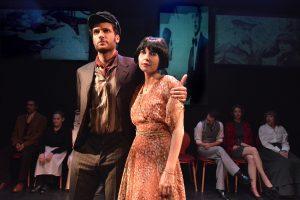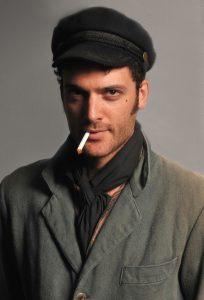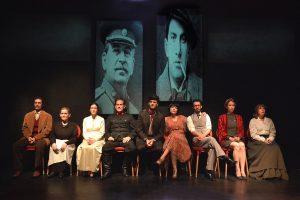Advertisement
“Stalin is too rude and this defect… becomes intolerable in a Secretary-General. That is why I suggest the comrades think about a way of removing Stalin from that [Central Committee] post and appointing another man in his stead…”
These words were written in December 1922 by V.I. Lenin in what came to be known as the ailing Soviet leader’s Testament. For a third of a century Lenin’s rebuke was - along with much of the Russian Revolution’s radical legacy - suppressed as Joseph Stalin rose to absolute power in the USSR. Three years after “Uncle Joe’s” death, on February 14, 1956 at the 20th Communist Party Congress, the new Soviet Premier, Nikita Khrushchev, dared read Lenin’s Testament aloud as part of his “Secret Speech.” Later that year Lenin’s text was finally published and made public to a people who had been bamboozled, purged and disappeared for decades.
Playwright Murray Mednick’s ambitious Mayakovsky and Stalin can be viewed as perpetuating the de-Stalinization process and rehabilitating the work and stature of socialists who suffered grievously under the so-called “Man of Steel’s” iron grip and strongman rule, which butchered the Central Committee Lenin had tried to warn to expel their crude General-Secretary with show trials, ice picks in the back of the skull and so on. Indeed, this extremely intellectual two-acter grapples with highly complex, compelling subject matter and is a must see (and hear) for those interested in revolution and art.
Having said that, revolutionary artists, theoreticians, activists and other viewers may be interested by the topics but disagree on the Obie award-winning Mednick’s conclusions and in the treatment and presentation of this seasoned stage stalwart’s play. I’m tempted to call M & S a “dramatization” of its themes and issues, but there really isn’t much drama per se, in the conventional sense. On the bare stage of the Lounge Theatre nine chairs are lined up against the wall, motherfuckers. There is enough fabricated brick and actual brick walls for a dictator’s firing squad to liquidate dissidents and other “enemies of the people.”
The brick motif may be a sly reference by scenic designer Nick Santiago to two of the ensconced characters, editor Osip Brik (Andy Hirsch) and actress Lilya Brik (Laura Liguori). The tall title character, poet Vladimir Mayakovsky (Daniel Dorr), is carrying on a torrid affair with Lilya, a practitioner of free love. Along with the six other dramatis personae they alternate sitting in and rising from their onstage seats and delivering dialogue, soliloquies and monologues, with minimalist if any actual action.
Enthroned in another seat is the “chairman” of the chair people, the eponymous Joseph Stalin (Maury Sterling, whose face resembles the young Kris Kristofferson’s - although one suspects Stalin wouldn’t sing “freedom’s just another word for nothing left to lose”). The uniformed tyrant in shiny high black boots clashes with his second and much younger wife Nadya (the long suffering Casey McKinnon). The Georgian also holds forth and one of the many interesting things about Mayakovsky and Stalin is that it presents the Soviet head of state’s point of view. Against all odds Sterling’s Stalin, spouting Mednick’s lines and the party line, makes the bureaucrat-in-chief sympathetic. Interestingly, he refers to himself as an “intellectual.” Some (although not moi) may even commiserate with him as a henpecked husband, much put upon by an out of control wife who belittles him in public.
So the play proceeds in a nonlinear (and non-Leninist - one suspects Mednick is a Menshevik, ha ha ha) way and is more spoken word than mise-en-scène. There’s little blocking for the Briks and company. Those interested in the real life characters and concepts may find this style to be stimulating and absorbing. But most uninterested in and unfamiliar with leftwing politics, radical art, etc., are likely to find M & S to be ponderous, pontificating, boring and confusing. Santiago’s projections of still and moving images of the real life historical figures enhance the play visually, especially as the movement on stage is often static.
Perhaps it’s inevitable for a show about a writer and spoken word artist and a politician who delivered speeches to be very talky and wordy. In any case, it’s ironic yet arguably appropriate that a play about artists who fell into official disfavor for “formalism” are presented in such a formalistic exercise. But the script’s flaws include Mednick’s glaring omissions by not citing the dates when events of the drama (such that is), which goes back and forth in time, take place. What year did Mayakovsky insult his audience? When the czar or the Bolsheviks were in power? When did Lilya persuade Stalin to restore Mayakovsky’s reputation? In real life, Lilya’s sister Elsa (Alexis Sterling) emigrated and left the Soviet Union, but this is never made clear and for most of the play the actress just sits onstage in one of those nine chairs (not to be confused with Mel Brooks’ Russia-set comedy, The Twelve Chairs) with nothing to do except watch the actors like the rest of the audience.
With their outré, outlandish and outsized lifestyles, personas, personalities, garb, etc., it’s easy to make comparisons between artists of the Bolsheviks’ early revolutionary days to the likewise free loving Yippies, etc., of the 1960s, but this is more in form than in content. Sergei Essenin (who married Isadora Duncan, as depicted in Karel Reisz’s wonderful 1968 film Isadora, aka The Loves of Isadora) may have seemed like a wild man of Borneo comparable to the shenanigans of countercultural figure like Jimi Hendrix or Keith Moon or Jerry Rubin, but there is an essential difference between the pioneering Bolshevik artists and their ’60s “counterparts”:
What is most important about Mayakovsky, Meyerhold, Eisenstein, Vertov, Essenin, et al, is that for about a decade the artistic and political avant-garde were united in the new Soviet Union. The latter provided the talents with the means to pursue their radical films, poems, plays, painting, etc., in order to spread socialist ideals via a cultural revolution. Whereas throughout the 1960s and 1970s the avant-garde artists were always fighting the state - never subsidized and supported by it.
Mayakovsky and Stalin explores how Stalinism replaced the Bolsheviks’ project for spreading socialism through world revolution by consolidating the state and pursuing the building of “socialism in one country.” For reasons beyond the scope of this review bureaucracy and despotism replaced socialist democracy. This meant that as the politics became more conservative, the arts had to also, as “socialist realism” set out to tame the avant-garde artistes, who tried to create a revolutionary form to express their revolutionary content.
One’s own politics will probably determine whether the viewer gives M & S a thumbs up or sends it to the Gulag. I suspect that those who side with the Left Opposition, Trotsky, the anarchists, etc., will tend to support this two hour or so play, while pro-Stalinists will hate it. I lean towards appreciating works that just bring lefty topics up. It’s great that congressional candidate Alexandria Ocasio-Cortez (the card carrying Democratic Socialists of America member who is making a keynote speech at August’s Left Coast Forum in L.A.) and Bernie have reintroduced the word “socialism” into America’s public discourse, where it had been “banned” from the lexicon for so long. DSA-member Harold Meyerson’s July 22 L.A. Times op-ed expressed it well: “Socialism is Back.” On June 30 Michelle Goldberg’s opinion piece “The Millenial Socialists are Coming” was published in the N.Y. Times.
The “times” are literally a-changing. So much so that rightwingers are “terrified” by the appeal of Ocasio-Cortez’s calls for universal healthcare and higher education. On July 24, Stephen Colbert mocked this hysterical “fright on the right” on his Late Show, jabbing a reactionary who attended an enthusiastic rally for AOC, traumatized by the promises of essential services for ordinary people by scribbling “there but for the grace of god go I.” Colbert quipped: “You know that God’s a socialist, right? Jesus didn’t charge the lepers a co-pay.” (Does CBS now stand for: “Communists Bolsheviks & Socialists”?)
So I for one am grateful that Mednick is remembering Mayakovsky and exploring these thorny themes. As for Stalin, in addition to Mednick’s meditation, earlier this year the feature film The Death of Stalin was theatrically released and on Aug. 18 Jews, Christians and Screwing Stalin opens at L.A.’s Matrix Theatre. Why all this resurgence of interest in Stalin? Maury Sterling, who plays Uncle Joe in M & S, believes it’s because of “Putin - people are trying to understand dictators and the power of an idea.”
Another point to be made about M & S is how the whole #MeToo and Time’s Up movement and the fight for female empowerment is playing out on L.A.’s stages, here in one of those causes’ ground zeroes. Stalin’s wife Nadya is the archetypal oppressed, abused woman, while the sexually liberated Lilya Brik symbolizes the emancipated woman, as does Chantelle Albers’ depiction of another female in control of her own sensuality, Pamela Harriman, does in Their Finest Hour: Churchill and Murrow, which has been extended at North Hollywood’s the Brickhouse Theatre. (Laura Liguori said she prepared to play Lilya by reading a volume of her love letters to and from Mayakovsky, adding that “Mayakovsky was a great letter writer.”)
Dorr depicts Mayakovsky as having a perpetually agitated state of mind - but what would you expect from an agitator and agitprop artist who had joined the Bolsheviks when he was only 14? The ensemble is well-directed by Mednick, with a special shout out to Ann Colby Stocking as Masha, Nadya’s servant - and apparently the only real proletarian among these characters constantly prating on and on about the workers’ state.
And now, dear reader, I will leave you with my favorite quote from a Mayakovsky poem: “There’s no grey hair in my soul.”
The world premiere of Mayakovsky and Stalin is being presented by Padua Playwrights on Fridays and Saturdays at 8:00 p.m. and Sundays at 3:00 p.m. through August 19 at the Lounge Theatre, 6201 Santa Monica Blvd., Hollywood, CA 90038. For more info and reservations: (323) 960-4443 or www.plays411.com/stalin
L.A.-based film historian/reviewer Ed Rampell co-presents a screening of Cuba’s “Strawberry and Chocolate” on July 26: http://www.peoplesworld.org/article/cuban-film-strawberry-and-chocolate-to-screen-in-l-a/. Rampell presents a symposium August 10th in San Diego: http://tikioasis.com/symposiums-2018/sex-in-south-seas-cinema/. The third edition of “The Hawaii Movie and Television Book” co-authored by Rampell is available at: https://mutualpublishing.com/product/the-hawaii-movie-and-television-book/ .




